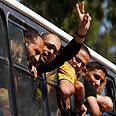
Ayman Sharouna, 36, was arrested last week in the West Bank town of Dura after intelligence indicated that he has rejoined Hamas and is therefore in "blatant violation of the terms of his release," an IDF official said.
Related articles:
- Palestinian freed in Shalit deal arrested over terror activity
Gilad Shalit meets Sarkozy in Paris
Abbas promotes terrorist released in Shalit deal
Sharouna was freed in October as part of a prisoner swap that secured the release of IDF soldier Gilad Shalit from Hamas captivity. Israeli authorities stipulated that any freed convict who resumes terror activity is to be arrested and forced to serve the rest of his original sentence.
Sharouna was sentenced to 38 years in Israeli prison for his involvement in a terror attack that injured 18 in Beersheba in 2002, as well as shooting attacks during the second intifada.
A special three-judge panel is expected to convene early next week at the Ofer Military Court near Ramallah to discuss the terrorist's punishment.
Ruling could set precedent
Shortly after the Shalit deal went through, then-GOC Central Command Avi Mizrahi asserted that any freed Palestinian inmate who is arrested on suspicion of committing a security violation or criminal activity is to be brought before a panel that would decide his fate. Sharouna's case is the first to be brought before the commission, whose ruling could set precedent.
IDF officials said that dozens of prisoners who were freed in the West Bank as part of the Shalit deal have breached the terms of their release, although most of the violations consisted of prisoners leaving their residential area or failing to report at the Coordination and Liaison Administration once a month.
In one case, a terrorist was arrested for trying to cross the Rantis Checkpoint. Another convict was stopped while trying to cross into Jordan through the Allenby Bridge.
The photographs and details of dozens of freed Palestinian inmates have been distributed to soldiers manning checkpoints and patrolling the West Bank. Moreover, troops occasionally patrol the areas where the terrorists reside and hold surprise inspections at the convicts' homes.
- Receive Ynetnews updates
directly to your desktop















